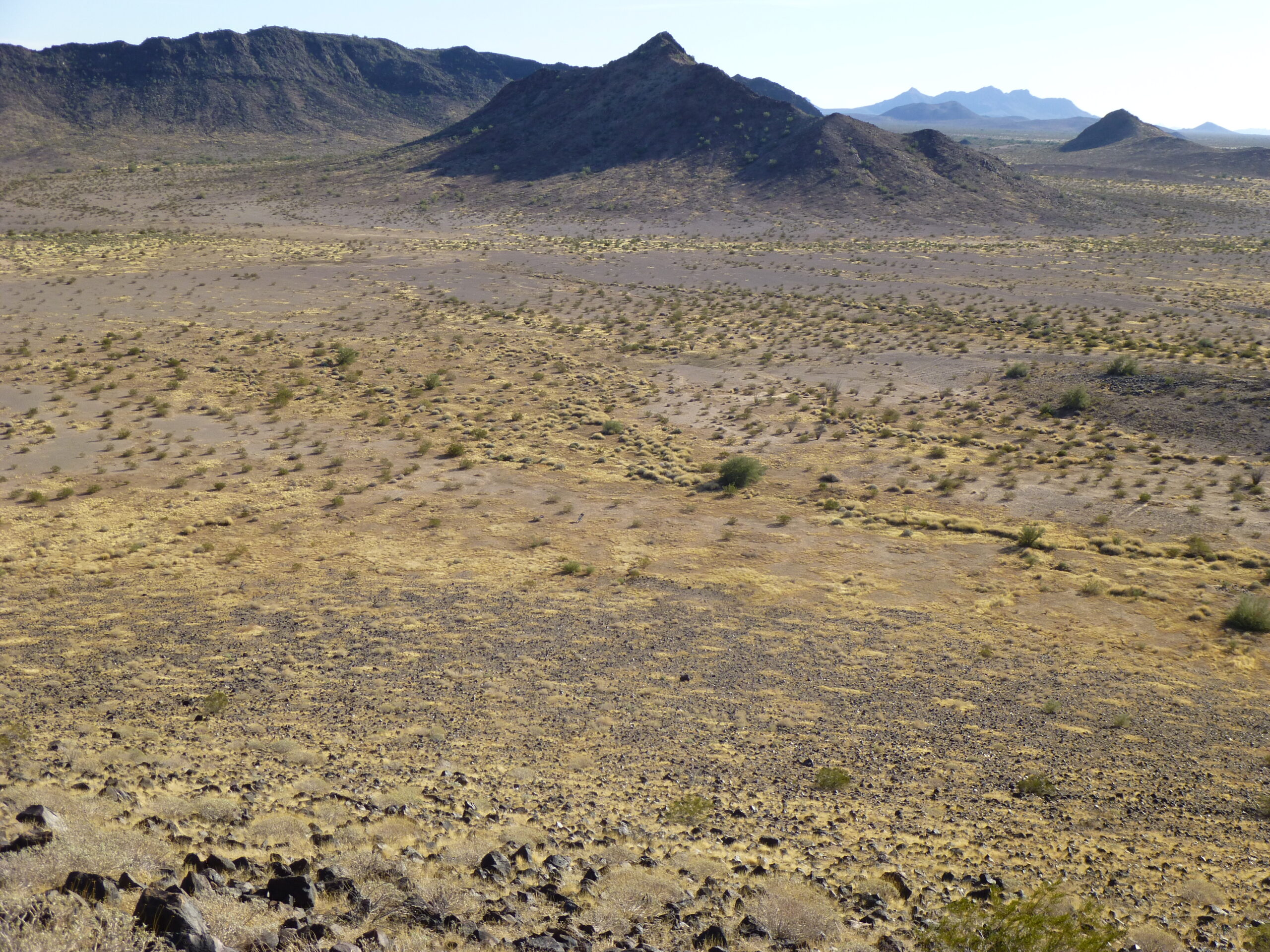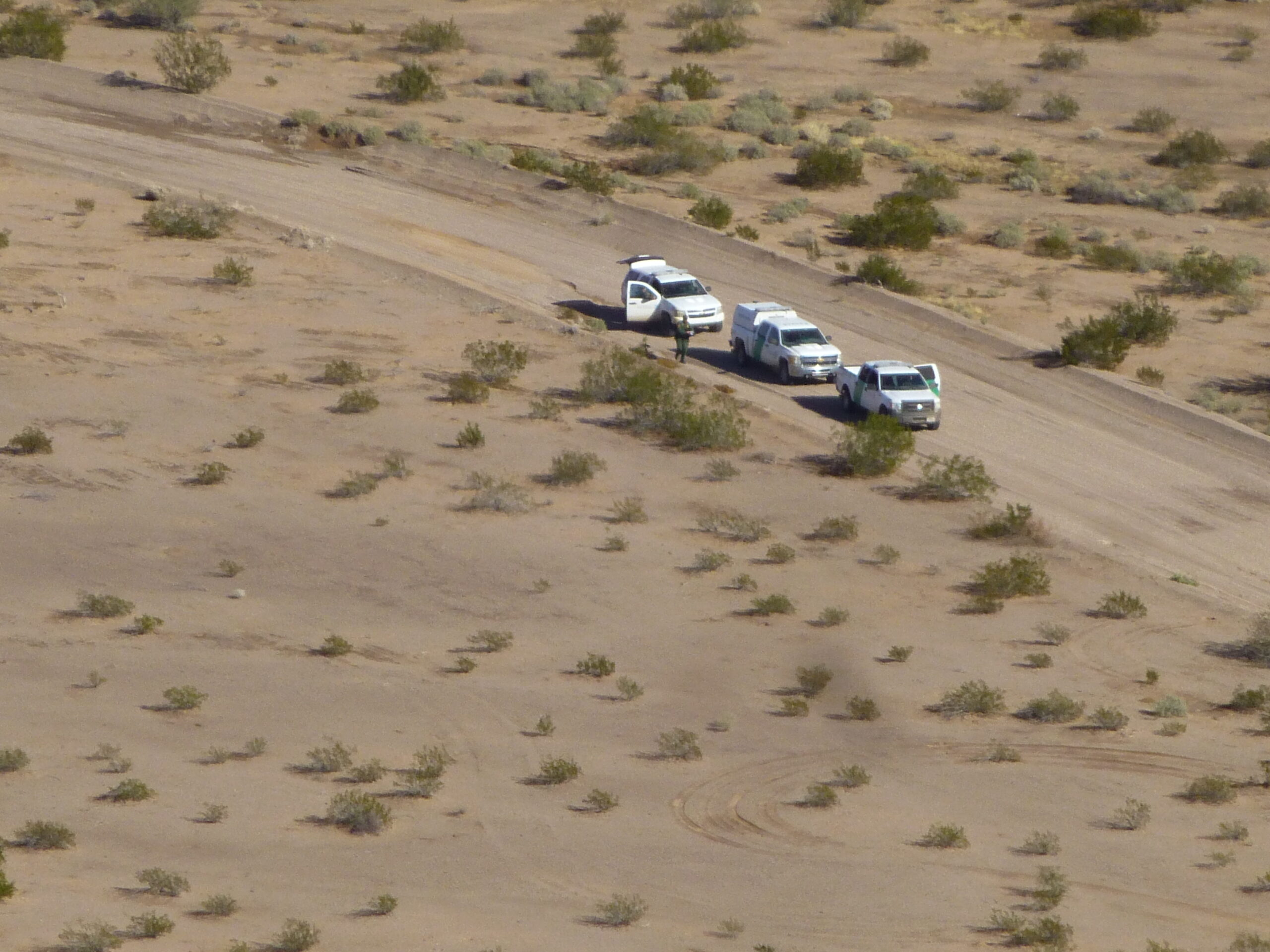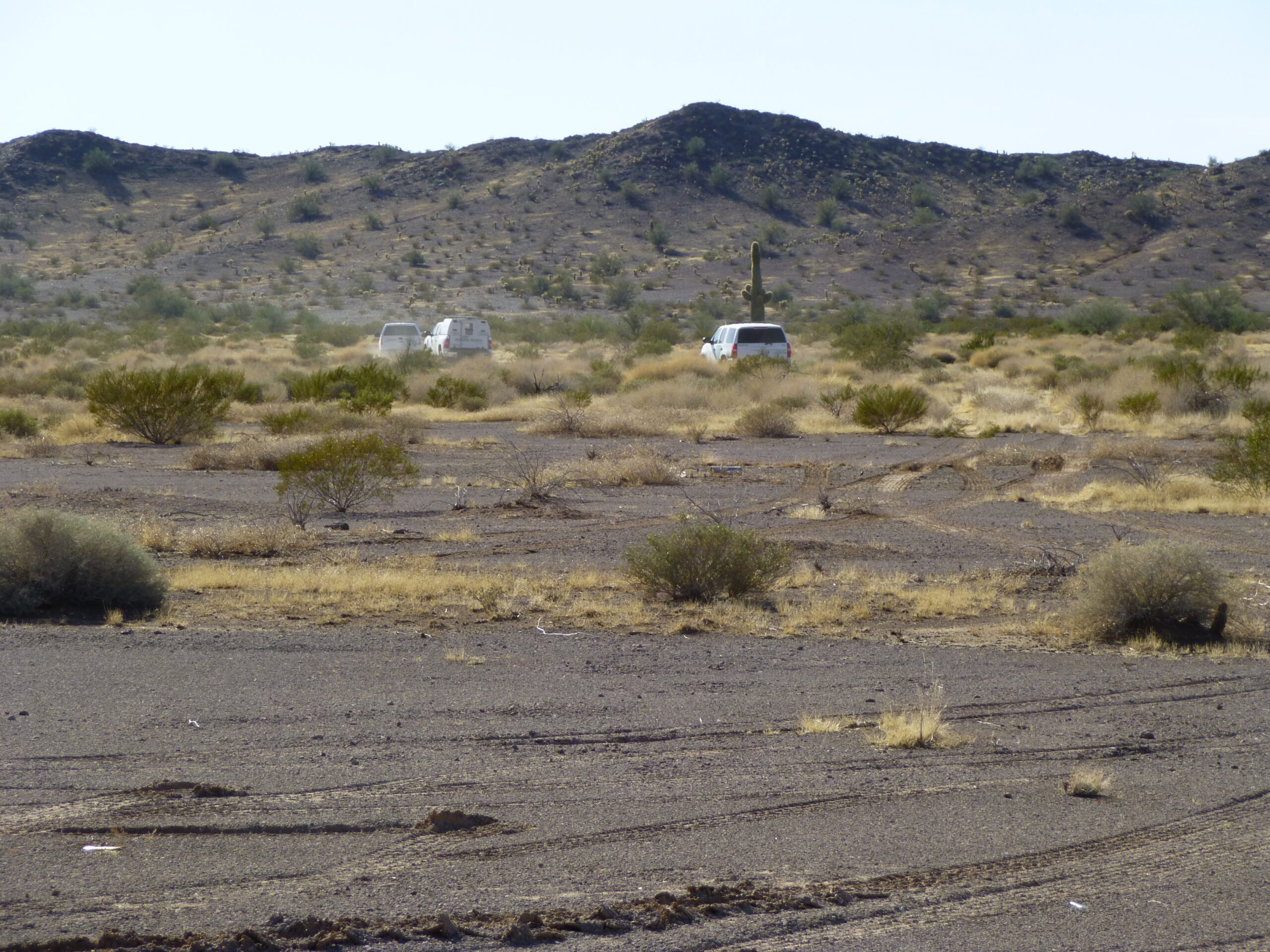Please be sure to read the two previous instalments of this story before starting in on this one.
Well, I think I’ve saved the 5 best and most exciting tales for last. I hope you enjoy them.
Twenty-some years ago, Brian and I were returning from a successful climbing trip out on the reservation. We were almost home – another 20 miles and we’d be off of both the gas pipeline road and the res itself. Up ahead, we saw a commotion – several vehicles and a lot of people. We slowly pulled up to the spot where all the activity was taking place. Once there, immediately we were approached by armed BP agents who demanded to know who we were and why we were there. It turned out that we had driven right into the middle of an active drug bust.
Off to the right side of the road were parked two large SUVs, like Chevy Suburbans. Standing next to them were about 20 Hispanic-looking people – men, women and children, guarded by a BP agent with an automatic rifle. We explained to the agents that we had spent the last 2 weeks climbing. They asked us to open up the back of the truck so they could inspect what was inside. We did, and when the stench of dirty clothes, damp sleeping bags and all of our accumulated trash hit them, they said to close it up again. The part that they were having a real problem with was why did we happen to arrive just as the bust was taking place – were we accomplices, or somehow involved? The best explanation we could give them was that it was purely a coincidence. Reluctantly, they accepted our explanation and said to carry on. We were glad to leave. It was still rather un-nerving to have a huge Blackhawk helicopter follow us for a short while afterwards, though. The next day, the local newspaper carried a story of the bust – 2,000 pounds of marijuana was being smuggled in the SUVs along with the indocumentados. Plenty of reason for the BP to be suspicious of our untimely arrival, I guess.
Deep within Arizona’s Crater Range, virtually all of which is strictly off-limits to anyone but US Air Force personnel, we were enjoying a day of stealth climbing. As we sat perched atop our third peak of the day, we saw some movement along a road a few miles away. It gradually came closer, and we could start to make out identifying marks of the BP. There were 3 vehicles. They would drive for a bit, then stop and get out and follow our tracks. You see, we had ridden mountain bikes into the area. The road was pretty good for the most part, but some stretches were too soft, so there we got off the bikes and walked them through the adjacent desert until we reached a point where the road was rideable once again. It was on those desert stretches that they tracked us on foot.
We watched them follow our tracks, and at the spot where we left the main road and started on a lesser track, they did too. We knew then that they had us dead to rights, and all we could do was watch them drive right up to where we had stashed our bikes.
We walked down the mountainside in plain view of them and soon arrived at the spot where they were waiting. Hands in plain view, we announced to them that we were US citizens and were there to do some mountain-climbing. There were 11 BP agents – 7 men and 4 women. They said that they were out on a training mission, and that following our tracks was an excellent training exercise for the new agents. We complimented them on their tracking skills, which they appreciated. They mentioned that they had seen us on our mountaintop perch well before they actually arrived, which surprised us.

The pointed peak is the one we were perched on while the BP tracked us. The road runs to the left of the peak, then behind it. Our bicycles were stashed on the desert floor to the right of the peak at its base.
We apologized for being in a place that was totally closed to the public. They said that they didn’t care in the least, that they weren’t there to enforce anybody else’s rules, including those of the Air force – all they wanted to do was to catch Bad Guys. After handshakes all around, they wished us well, told us to be careful and drove away.
One fine November about 20 years ago, Dave and I had spent some enjoyable days climbing in the La Lesna Mountains down by the Mexican border. It came time to leave the area. We were driving north on an old road, some distance apart, each of us in our own Toyota pickup with Dave out front. He got on the radio to say that a chopper was circling him. I caught him up, we each got out of our trucks and waved to the pilot.
He didn’t seem to want to land, so we kept on driving, this time with me out front. Little did we know that he had called for backup. Before long, the road passed through a deeply-rutted spot hemmed in by thick brush on both sides (we were crossing a branch of the Chukut Kuk Wash). It was like driving into a tunnel, with no escape on either side. I radioed Dave that there was a vehicle ahead blocking the way. At first I couldn’t tell if it was an abandoned one, but soon saw that it was moving towards me with its headlights on. We were trapped, and I didn’t know what was about to hit the fan, but I was scared. I got out – Dave pulled up behind me and got out too. What the hell was going on!!
A uniformed young man got out of the vehicle and announced that he was with the U.S. Border Patrol. He told me in a firm voice to walk back to my vehicle, and I knew he meant business. Making sure to keep my hands in plain sight, I told him we were climbers and had been climbing nearby during the past two days. Then I told him I had a permit from the Tohono O’odham nation, which he asked to see. Finally, he asked us both for identification. The permit, coupled with our ID and co-operative attitude, seemed to convince him that we were who we claimed to be, so he radioed his associates that all was well. Nevertheless, they must have been amazed to see us way out here, where normally they would only run into Bad Guys He informed us that they had stopped a vehicle last night and had confiscated 1600 pounds of marijuana. It had come up from Mexico and they had wondered if we were somehow associated with those smugglers. We chatted for quite a while. He told us that the drug smugglers had a network of lookouts scattered through this part of the desert, and that they used encrypted radio signals so their drivers could avoid getting caught. Furthermore, he shared that the smugglers had a 2-meter repeater hidden somewhere that was giving them a distinct advantage over law enforcement. Little did he know that he was talking to the ol’ Desert Mountaineer, who had stood on top of most of the 400-odd summits on the reservation! Dave and I were both licensed ham-radio operators and could relate to what he was describing. I recalled a strange radio repeater I had seen a few years before in a nearby mountain range and when I told him about it he seemed excited. He felt it had probably been placed by drug smugglers, and I felt certain that it was the one they were looking for. I told him I’d send him the GPS co-ordinates of the exact spot, and he said they’d send a chopper to check it out. Well, I did and they did, and I know for a fact that the repeater was destroyed. I have had many personal encounters with Border Patrol agents over the years, all of them positive, but this one was special.
We had moved 26 miles into the bombing range in forbidden territory on our first day and in the evening set up our campsite, then got down to the business of preparing some supper. Each of us had a tiny stove that screwed on to a small cylinder of a butane-propane mix, and those did a good job of boiling water for our noodles. As we cooked down in the wash, it became completely dark and we turned on our headlamps. The temperature dropped quickly and we added layers of clothing as we chatted about the great day we’d had. Then something totally unexpected happened, something that scared the hell out of us.
Mark was facing up towards the water tanks as he cooked his food, and what he saw changed everything. He said something to me, alerting me to the situation, and I turned around and looked up the hill. There, in plain view, were four very bright lights, the kind that climbers wear on their heads to keep their hands free at night. They were spread out along a line maybe 60 or 70 feet long, and approaching us quickly out of the darkness. A voice, loud and clear, shouted out in English “Come out where we can see you, and keep your hands up and in plain view.”
To say that we were in a state of shock is putting it mildly. We scrambled up the side of the wash and walked out into the open with our hands up, facing the lights. Mark shouted out “We’re American citizens!”, as we walked towards them. One of them asked “Do you have any firearms?” We answered “No” and kept walking. In a few moments, we stood in front of them. We told them we were mountain climbers, out there in the Aguilas to climb everything in sight. By now, we realized that the four of them were Border Patrol. Their uniforms made it obvious, and they told us they were the Mountain Unit. They seemed proud of that, and rightly so. But still the question, how did they know we were out here at Thompson Tank?
Their answer surprised us. They explained that one of their vehicles on routine patrol had spotted our bicycle tracks heading south from the highway. The only thing that made any sense was that scouts for one of the Mexican drug cartels had headed south into the mountains to help guide packers through with loads of drugs. They had driven vehicles all the way in to Eagle Tank, noticing every place we’d stopped, walked around, even taken a leak – they had also found our bikes and the extra food and gear we’d hidden. More determined than ever, they had, using headlamps in the dark of night, followed our footprints for 3 miles over every kind of terrain through the mountains to finally come upon us as we cooked our supper. We apologized profusely for having dragged them all the way out there, but they said not to worry, that was their job. They seemed genuinely relieved to learn that we were not Bad Guys. We told them, in detail, of our climbing plans for the next several days out there, and they seemed intrigued. They peppered us with questions, asking if we had climbed this peak or that one, well-known landmarks within 50 miles of there, and were surprised that we had climbed them all. We assured them that we would contact the Border Patrol with coordinates of any illegal activity we might see. They even honored us by saying that “You guys should join the Border Patrol”. Oh yes, they said they’d put our stuff back where they’d found it. They had found it where we’d hidden it an an earlier campsite, including our mountain bikes (they had confiscated them). By then, we’d probably been talking for half an hour, and they finally said they should probably start back. Oh yes, one more thing – we asked them if it were likely we’d run into anyone out there, and they said probably only people working for the drug cartels. They said it was a shame we were unarmed, as the Bad Guys often were carrying weapons; also, they said to give any of those guys a wide berth, as they’d jump at the chance to take our food and gear, all of it. Each of them shook our hands and wished us well, urging us to be safe. Moments later, they had faded back into the night. That visit was a hot topic of conversation for the rest of the evening, and it was late by the time we retired.
It was Day 5 of a stealth climbing trip into a military proving ground that was so off-limits to the public that just thinking about going in there gave you a headache. We had moved deeper in each day, moving our base of operations as we went and climbing peaks along the way. Early that morning, we had just dropped our gear at the spot where we’d set up Camp 3 and then headed out to our first climb of the day. That’s where all hell broke loose. As I climbed up a narrow ravine, I inadvertently started a rockslide that swept me down with it. It was all over in a few seconds, but my arm took the worst of the damage – we knew right then that our climbing trip was over.
We made it back to our Camp 3, packed up our gear and started the long march back out. Late in the day, we finally arrived at the site of our Camp One, at the end of an old road. Using a cell phone, we managed a call out to a BP station some miles away on Highway 95 just as it was getting dark. Our hope was that they would be willing to drive in to our location and give us a ride back out – they didn’t even hesitate – we gave them detailed instructions on how to find us, and they told us to sit tight until we got there.
Now here’s the thing – if you decide to drive the rough 7-mile dirt road in to where we waited, you’ll be greeted with a military sign stating that the road is closed to all, no exceptions, and that entry is forbidden. The BP didn’t care, and just blew right past the sign to come to our rescue. We were waiting in the dark at the end of the road, right where we said we’d be, and never so glad to see anyone. The put us into the cage, a compartment on the back of their truck where they could safely lock and transport indocumentados. It took a while, but eventually we arrived at their station along Highway 95. The supervisor looked at my injuries and offered to call an ambulance – I thanked him, but decided I’d sooner drive myself back home to Tucson where I could more easily get ongoing medical care (we had left our vehicles parked at their station at the start of our trip). Of all my encounters with the Border Patrol in almost 40 years, this last one was certainly the most meaningful. I will always be grateful for their help, and also for what they do every day to keep our border safe.
So there you have it, Folks – some of my more interesting encounters with the US Border Patrol. I hope you’ve found the stories entertaining.


